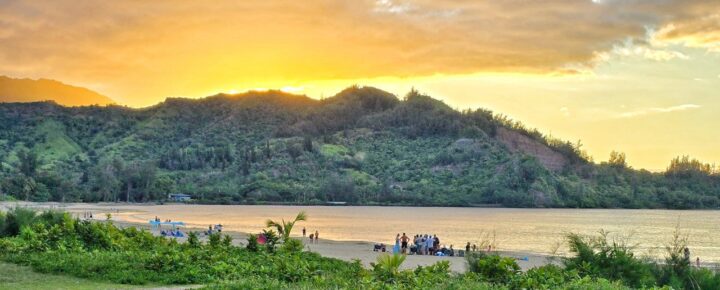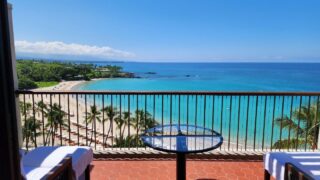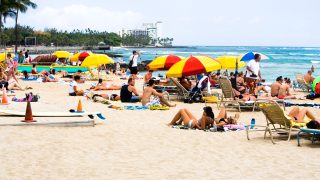The ongoing shift in the Hawaii vacation rental landscape continues to provoke unprecedented debate, as the latest Hawaii Tourism Authority (HTA) report shows a further slide in rental demand. This trend mirrors what we see in other parts of the world and raises questions about the future of vacation rentals and our housing market.
Behind the latest HTA numbers, residents and travelers continue weighing in with personal stories and sharp insights that paint a more complex picture in the islands.
What residents and travelers are saying about vacation rentals.
Reader feedback from prior Beat of Hawaii articles on this topic offers a glimpse into the deeper tensions surrounding Hawaii vacation rentals.
One resident, Carla H., summed up the frustration many feel: “Vacation rentals have turned my once-quiet neighborhood into a revolving door of strangers. It’s not just noise—it’s the complete loss of community.”
Several others echoed her sentiment, noting how vacation rentals have impacted housing availability and affordability.
On the flip side, travelers shared different perspectives. Jack R., a frequent visitor, said, “Vacation rentals provide a unique way to experience the islands. Hotels can’t offer the same sense of immersion in local culture. I’d hate to see them disappear entirely.”
Meanwhile, others, like Megan S., pointed out the growing financial burden of staying in vacation rentals: “The fees are insane. By the time you add cleaning and service fees, you might as well stay at a luxury hotel.”
For some, the issue is more subtle. Michael T., a property owner, shared his concerns about regulatory uncertainty: “I’ve always followed the rules, but the constant threat of new restrictions makes it hard to plan. Are we trying to kill tourism here?”
Hawaii aligning with global trends.
Hawaii’s evolving relationship with vacation rentals is similar to regulatory movements in cities worldwide. In New York City, the 2023 implementation of Local Law 18 sharply reduced the number of short-term rentals, with listings dropping 83% yearly. While this curbed illegal rentals and boosted hotel revenues, it did little to improve housing affordability, and a black market for rentals quickly emerged.
In Europe, cities like Rome and Barcelona have enacted sweeping restrictions to combat over-tourism and soaring rents. Rome’s mayor recently warned that “entire blocks of the center are turning into B&Bs,” highlighting the loss of residential character in the historic city.
Meanwhile, cities like Málaga have banned new short-term rentals in tourist-heavy neighborhoods. Amsterdam now imposes steep fines for unregistered rentals, aiming to restore a balance between tourism and local living. Airbnb, however, has pushed back against these measures, claiming short-term rentals contribute minimally to housing crises and tourism saturation.
While not yet as restrictive, Hawaii appears to be heading in a similar direction. The state’s ongoing discussions about stricter regulations reflect the same balancing act between preserving local housing and sustaining tourism revenue.
What the latest HTA data reveals.
The latest Hawaii Tourism Authority report for November 2024 highlights an ongoing shift in the vacation rental market. Compared to November 2019, demand for vacation rentals plunged 38.3%, and occupancy dropped by a striking 20.2 percentage points. These figures reveal a long-term decline beyond seasonal or pandemic-related disruptions.
While the supply of unit nights increased slightly in 2024 compared to 2023, it remains well below pre-pandemic levels. Occupancy also dipped to 48.4% statewide, and the average daily rate climbed 6.5% to $313. Rising costs are a recurring theme, with today’s vacation rentals commanding nearly 50% higher rates than in 2019, even as demand and occupancy continue to lag.
Adding to this complexity is a growing sense of uncertainty among visitors.
Many travelers are now questioning whether vacation rentals will remain a reliable option in Hawaii. “Will they still be legal next year?” one frequent visitor wondered in a prior Beat of Hawaii discussion.
Another noted, “It feels like Hawaii doesn’t want us staying in rentals anymore, but hotels don’t always work for families.”
Such doubts, coupled with rising costs, appear set to dampen enthusiasm for Hawaii vacation rentals further and steer visitors toward alternative lodging options—or in some cases, to other destinations altogether.
What’s next for Hawaii?
As Hawaii grapples with these trends, several questions remain unanswered. Will the state and counties continue adopting more aggressive regulations, following the examples of NYC and European cities? How can Hawaii balance the needs of residents, who demand affordable housing, with those of travelers seeking unique experiences?
Reader comments suggest that solutions will require compromise. As one commenter, Sarah P., noted, “We need smart regulations that protect residents without punishing responsible hosts. It’s not all or nothing.”
For now, the future of Hawaii vacation rentals remains uncertain. However, it is clear that the debate—and its implications for island tourism, housing, and local communities—is far from over.
Please continue to share your comments with us, the HTA, and the Hawaii travel industry who are reading.
Get Breaking Hawaii Travel News







we have been visiting Maui for 38 years we normally take 2 or 3 units to fit our large family but the cost has put an end to that.
One of the biggest drawbacks is the exorbitant hotel/tourism fees that are demanded upon arrival.
The two bedroom to bath condo we rent isn’t impacting the housing mkt as to buy the unit would be close to $2M so who could afford that kind of money? I don’t believe the oceanfront rentals have any affect on housing and could be combined with off ocean neighborhoods that should be restricted to housing versus STR’s
Aloha all – I am a former STR owner on Kauai, but my husband and I now live in it full-time. Since we have owned our condo unit, the HOA dues have increased 177%, an increase of $1405. This makes our HOA dues almost $2200 Per Month. This is solely due to an over 400% increase in the HOA’s master property damage insurance after the Lahaina fire and other natural disasters across the nation. And now with the So Cal fires, little hope of a rate decrease is on the horizon. This means if we do move back to the mainland at some point and want to keep our unit, we will definitely have to raise our per-night rental rate from what it was previously (still much less than a hotel so we believe STRs help tourism which in turn helps locals), or if we go long-term rental, that monthly rate will have to be significantly higher as well. The bottom line is that owners who are landlords are at the mercy of rising costs (just like tenants are) and many charge only what they must to keep their property.
Let’s all be honest here for a second. Hawaii, particularly Maui will Never totally ban the STR’s once they realize the tax and employment losses it would realize, not to mention the lack of “affordable housing” that they’d never see. In the meantime we will continue to stay in the STRs until the day comes where it doesn’t make sense and at that point it will be “Aloha”.
As a couple who are home owners and residents of Kaneohe, we have two dogs, we are due a house tenting for termite mediation. Last time we used AirBNB to find a home on the windwards side to stay at a couple of nights, but we don’t have options this time. 6 years ago when we last tented our house, the future of legal AirBNB business outside of “tourist zones” was still being decided. Well, it’s been decided and all short term rentals around our home are illegal now. Leaving us with the choice of either not tenting our home, or boarding the dogs and staying in Waikiki with all the tourists, (at tourist costs, which we can’t easily afford on top of tenting).
Long story short, thank you Oahu, you’ve found another way to punish everyone including residents for the actions of a few misbehaving tourists by shutting the AirBNB options down.
The STR speculators on here, and everywhere, whine and complain that they are “helping” the people of Hawaii by hoarding houses to bring tourists into residential neighborhoods to make money.
It’s a big lie.
Look what speculators did to ruin Mission Beach, San Diego:
“Airbnbs in Mission Beach, San Diego. 31% of housing supply here is entire-home, unhosted short-term rentals, almost all are investment properties. During a supposed “housing shortage”.”
x.com/NotoriousAirbnb/status/1837589654847258888
My son lives in New Orleans and he hated Airbnbs because he couldn’t find affordable housing in the area of his choice. He became a staunch proponent against them.
Low and behold, for the past five years, New Orleans has practically banned Airbnbs.
Guess what?
My son still can’t find affordable housing.
Airbnb’s take up less than 1% of housing in most locales. To think vacation rentals are the cause of the housing shortage is a myth perpetuated by the big-bucks hotel lobby.
BTW: The money I made airbnbing part of my home paid for my son’s undergraduate and graduate education. Talk about ingratitude on my son’s part!
I have 4 older children and the six of us can’t fit in 1 hotel room. Also, there is an element of cooking together and playing board games or watching a movie where we can all fit on a sofa. If hotels start offering this option at an affordable rate I think they will fill up. Same for home rentals, if an affordable rate is offered, it will rent and people will come. The challenges are the taxes and cleaning charges are so high in Hawaii. Add to that maintenance & the high mortgages for properties, it’s hard to make any profit. The truth is, homes all over the world are double the cost post covid in areas with and without Airbnbs. Look for yourself on zillow or international home sales sites. Therefore, there is no solution here to bring home prices down. The only thing that will do that is the government person (it’s one person) who decides the mortgage percentage rate, brings it back down to 2-3% again like it was in 2021. That makes any mortgage payment more than 1/2 price.
Tracy, if interest rates for home mortgages come down, the price of housing is likely to increase. If the Fed were to raise interest rates to a more unaffordable level, fewer homes would be sold, they supply would increase, and, eventually, prices might come down. But home prices are sticky, and when interest rates go up, present homeowners are reluctant to sell, and this causes the opposite effect of maintaining high home prices. It is a difficult problem. A partial solution is for adult children to live with their parents, save their money, and buy a starter apartment. But many millennials, and I know a few, live with their parents and live high-on-the-hog (travel, restaurants, new cars, clothes, etc., etc.)
I’ve been enjoying HI for 40 years. Stayed at upscale hotels for my trips until about 18 yr ago when we started renting condos and homes. We always stay within a block or two of the beach and could never afford to buy any of the units. I believe these close to shore rentals have zero affect on housing because these aren’t in the price range of local buyers and wouldn’t be whether or not they are used as rentals. Keep rentals close to shore only and both tourists and residents can both have a good result
Sadly, I believe Hawaii is responsible for its own travel woes. From hotels at $3,000+ a night, to the announcement several years ago of the lists of tourist attractions on each island that residents wanted closed to visitors, HI seems to have become a bit less hospitable. Gee, IDK, could this be the reason for the decline? For heavens sake, it’s paradise. Do you want tourists or not? I’ve spent wonderful winters there, enjoyed every minute there, but won’t be able to ever go back because of the costs.
We liked to visit once or twice a year to the Islands, but with what’s going on with rates & the attitude towards tourists by a minority of people, we will be taking our vacation dollars to cruises & Europe, where we are welcomed. It makes me laugh when people talk about creating other sources of income for the Islands – great idea, but no one has any, and its been a Long time since the food industries left . In the meantime they are alienating the main source of income, tourism. Even if prices of housing crash, if no one is coming to visit, no one will be able to live as there will be no jobs.
When the stopping of short term rentals was originally discussed there was going to be a lottery and some STVR would be allowed. That never happened and in my opinion that was a better option. Take Kailua for example, if relatives or friends or visitors are a family of 4 or 5, it’s likely prohibitively
costly to stay in waikiki with needed multiple rooms and every meal out. There are no hotels in kailua. That’s not a bad thing, but i think a few licensed STVR options would be great. Not all over on every street, but a few. That’s what the original lottery was supposed to do, each zip code or area would be allowed a handful of short term rentals. The fact that they can exist in the “special tourist sections” like waikiki makes no sense to me, why allow them in an area with thousands of hotel rooms and not allow them at all in other areas. Each county is different too, which probably doesn’t help.
It’s sad that some people take advantage of the short term rentals and stay only a week instead of three weeks required in my building. The owners tell their renters that if anyone asks about your stay tell them 3 weeks. No one in management or security feels they have the right to question the renter. Either the owners or the renters appear to have little regards for the house rules which each unit has or should have the house rules booklet put chooses to ignore them.
These are the most maddening part about short term renters. Just because their is maintenance it does mean you leave trash thinking someone else will pick it up for you!
I can buy a used car for the amount we would pay for three weeks now. We would have gladly stayed three weeks but one week costs more than 18 days used to not so long ago.
Complaints: “Airbnb’s lining the streets” – hotels line the streets & have done so for decades, how is that different? “Expensive as a high end hotel “- absolutely not, there are loads of affordable bnb’s. Lobbyists support hotels & politicians listen, claiming the tourist industry will disappear if hotels fail. They’re sending tourists away with their false claims that BNB’s cause housing shortages. I pay 17.5% in taxes on BNB income, I’m retirement age but can’t afford to fully retire because of Hawaii’s high cost of living. Lived on the island 36 years and 25 in my home. I have a guest suite on the second floor, 2 guests max. No neighbors live close by & are unaware it’s a BNB until I tell them. BNB’s are not responsible for housing issues. Hawaii county & state need to find a workable long term solution because low income families still will not be able to afford monthly rent prices even if bnb’s do go to long term rental.
Aloha BOH Bro’s
Did I miss in your article any account for inflation or a slowing economy contributing to a dip in STR’s occupancy.
Especially for senior travelers on fixed incomes who are dealing with higher utility bills, insurance rates, food costs, rent and high interest rates.
In blue states like mine taxes and fees have gone through the roof on everything.
Your tradition STR stay visitors are dealing with how to make ends meet at home verses spending thousands on a trip to Hawaii.
So yes Hawaii be careful what you wish for slowing tourism without a plan to replace lost tourist dollars is going to bit you where the sun don’t shine and isn’t going to solve any of your social and housing shortage ills.